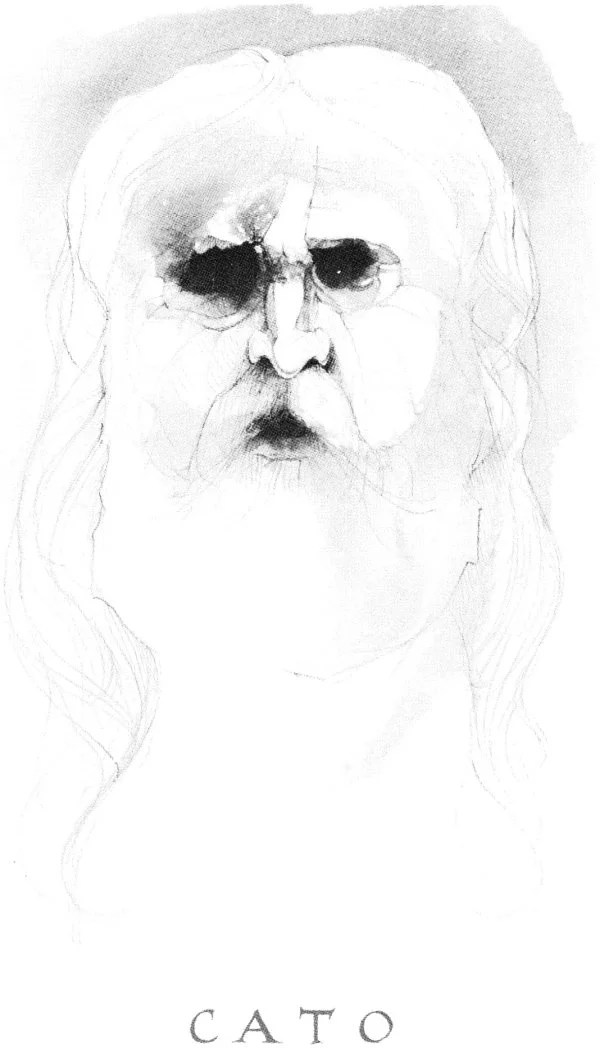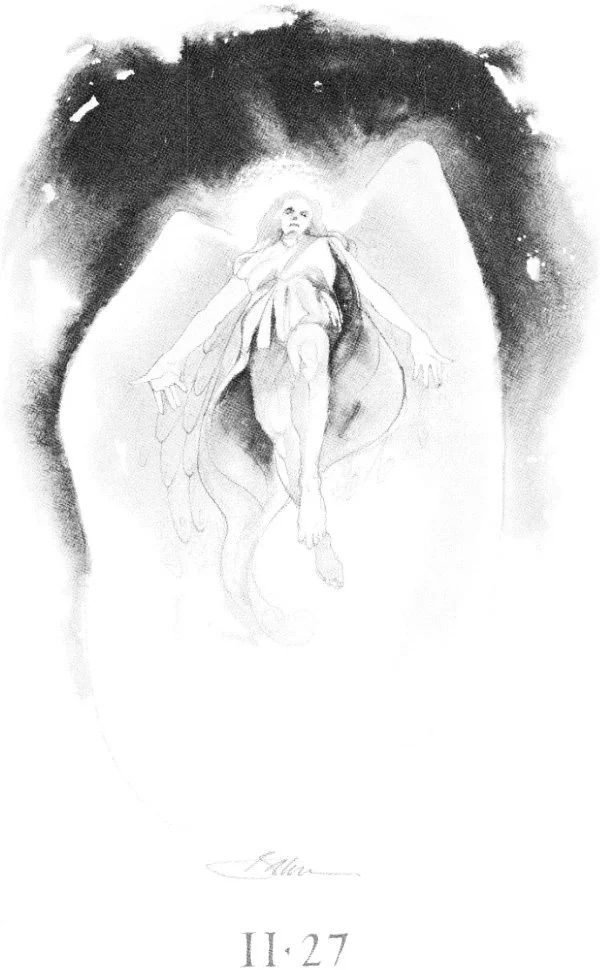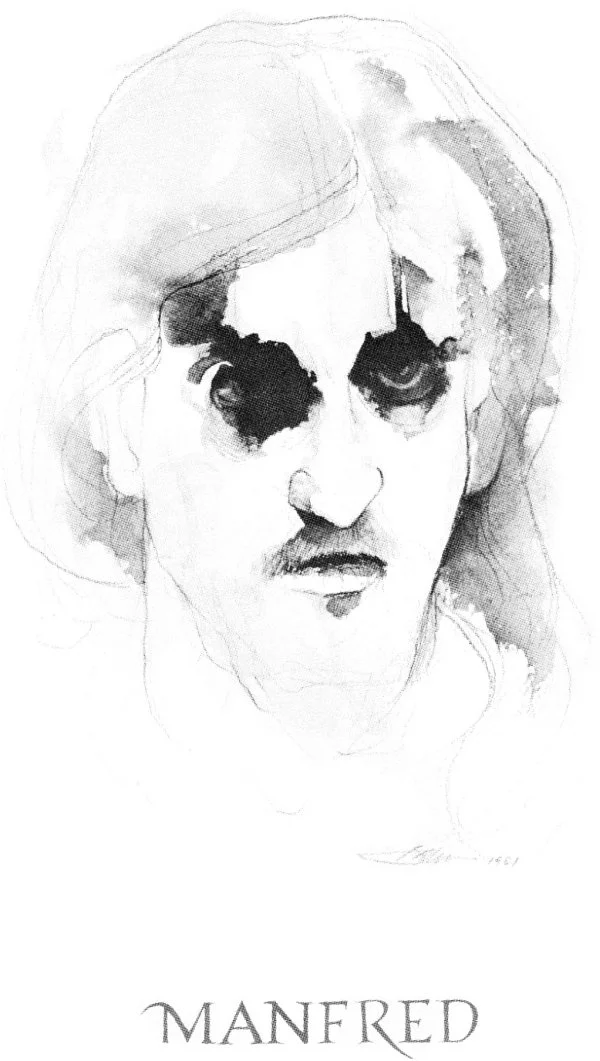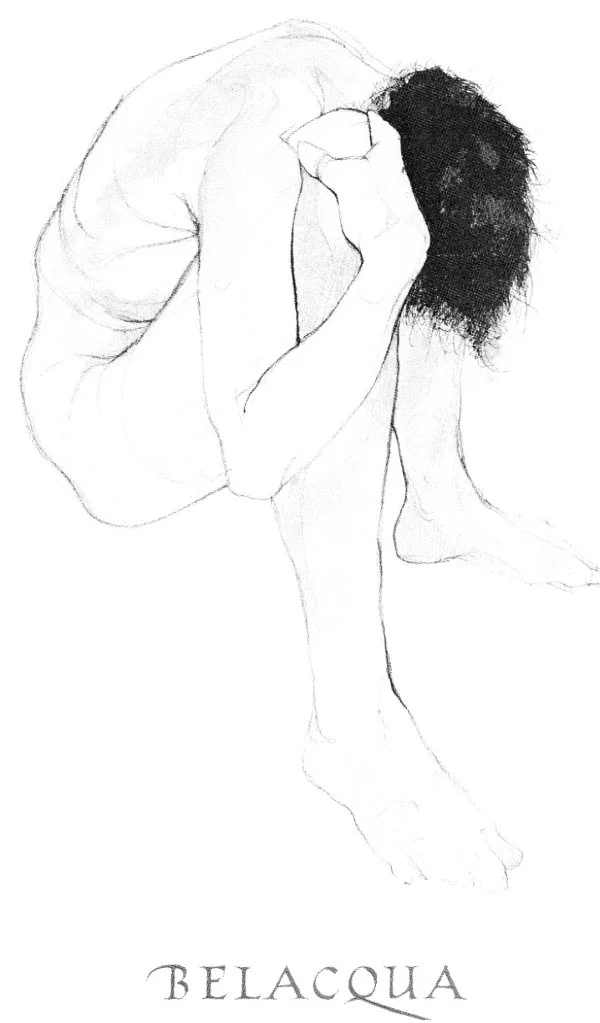Michael Bixler shared his craft and serenity with Barry Moser, Chet Grycz, and me. Laury Magnus—unfailing, invaluable—took soundings and governed the ungovernable sea of rough drafts like a “celestial nocchier[e].” Barry Moser, through the fourth volume on which we have worked together, has been both penetrating fabbro and buoyant friend, ever “disposto a salire” to the next volume.
Allen Mandelbaum
The Graduate Center of the City University of New York September, 1981


Click here to go to the line
Proem and Invocation. The skies of the Southern Pole before dawn. The four stars. Cato of Utica, custodian of the island Mountain of Purgatory. Cato’s queries and Virgil’s reply. Instructions by Cato. Virgil bathing Dante’s face and, on the shore, girding him with a rush.
To course across more kindly waters now →
my talent’s little vessel lifts her sails, →
leaving behind herself a sea so cruel; →
4
4 and what I sing will be that second kingdom, →
in which the human soul is cleansed of sin,
becoming worthy of ascent to Heaven.
7
7 But here, since I am yours, o holy Muses,
may this poem rise again from Hell’s dead realm; →
and may Calliope rise somewhat here, →
10
10 accompanying my singing with that music →
whose power struck the poor Pierides
so forcefully that they despaired of pardon.
13
13 The gentle hue of oriental sapphire →
in which the sky’s serenity was steeped—
its aspect pure as far as the horizon—
16
16 brought back my joy in seeing just as soon
as I had left behind the air of death
that had afflicted both my sight and breast.
19
19 The lovely planet that is patroness →
of love made all the eastern heavens glad,
veiling the Pisces in the train she led.
22
22 Then I turned to the right, setting my mind
upon the other pole, and saw four stars →
not seen before except by the first people.
25
25 Heaven appeared to revel in their flames:
o northern hemisphere, because you were
denied that sight, you are a widower!
28
28 After my eyes took leave of those four stars,
turning a little toward the other pole, →
from which the Wain had disappeared by now,
31
31 I saw a solitary patriarch →
near me—his aspect worthy of such reverence
that even son to father owes no more.
34
34 His beard was long and mixed with white, as were →
the hairs upon his head; and his hair spread
down to his chest in a divided tress.
37
37 The rays of the four holy stars so framed
his face with light that in my sight he seemed
like one who is confronted by the sun.
40
40 “Who are you—who, against the hidden river, →
were able to escape the eternal prison?”
he said, moving those venerable plumes.
43
43 “Who was your guide? What served you both as lantern
when, from the deep night that will always keep
the hellish valley dark, you were set free?
46
46 The laws of the abyss—have they been broken?
Or has a new, a changed decree in Heaven
let you, though damned, approach my rocky slopes?”
49
49 My guide took hold of me decisively;
by way of words and hands and other signs,
he made my knees and brow show reverence.
52
52 Then he replied: “I do not come through my
own self. There was a lady sent from Heaven; →
her pleas led me to help and guide this man.
55
55 But since your will would have a far more full
and accurate account of our condition,
my will cannot withhold what you request.
58
58 This man had yet to see his final evening;
but, through his folly, little time was left
before he did—he was so close to it.
61
61 As I have told you, I was sent to him →
for his deliverance; the only road
I could have taken was the road I took.
64
64 I showed him all the people of perdition;
now I intend to show to him those spirits
who, in your care, are bent on expiation.
67
67 To tell you how I led him would take long;
it is a power descending from above
that helps me guide him here, to see and hear you.
70
70 Now may it please you to approve his coming;
he goes in search of liberty—so precious,
as he who gives his life for it must know.
73
73 You know it—who, in Utica, found death →
for freedom was not bitter, when you left
the garb that will be bright on the great day.
76
76 Eternal edicts are not broken for us; →
this man’s alive, and I’m not bound by Minos;
but I am from the circle where the chaste →
79
79 eyes of your Marcia are; and she still prays
to you, o holy breast, to keep her as
your own: for her love, then, incline to us.
82
82 Allow our journey through your seven realms.
I shall thank her for kindness you bestow—
if you would let your name be named below.”
85
85 “While I was there, within the other world,
Marcia so pleased my eyes,” he then replied,
“each kindness she required, I satisfied.
88
88 Now that she dwells beyond the evil river, →
she has no power to move me any longer,
such was the law decreed when I was freed.
91
91 But if a lady come from Heaven speeds
and helps you, as you say, there is no need
of flattery; it is enough, indeed,
94
94 to ask me for her sake. Go then; but first →
wind a smooth rush around his waist and bathe
his face, to wash away all of Hell’s stains;
97
97 for it would not be seemly to approach
with eyes still dimmed by any mists, the first →
custodian angel, one from Paradise.
100
100 This solitary island, all around
its very base, there where the breakers pound,
bears rushes on its soft and muddy ground.
103
103 There is no other plant that lives below:
no plant with leaves or plant that, as it grows,
hardens—and breaks beneath the waves’ harsh blows.
106
106 That done, do not return by this same pass;
the sun, which rises now, will show you how
this hillside can be climbed more easily.”
109
109 With that he vanished; and without a word,
I rose and drew in closer to my guide,
and it was on him that I set my eyes.
112
112 And he began: “Son, follow in my steps;
let us go back; this is the point at which
the plain slopes down to reach its lowest bounds.”
115
115 Daybreak was vanquishing the dark’s last hour, →
which fled before it; in the distance, I
could recognize the trembling of the sea.
118
118 We made our way across the lonely plain,
like one returning to a lost pathway,
who, till he finds it, seems to move in vain.
121
121 When we had reached the point where dew contends →
with sun and, under sea winds, in the shade,
wins out because it won’t evaporate,
124
124 my master gently placed both of his hands—
outspread—upon the grass; therefore, aware
of what his gesture and intention were,
127
127 I reached and offered him my tear-stained cheeks;
and on my cheeks, he totally revealed
the color that Inferno had concealed.
130
130 Then we arrived at the deserted shore, →
which never yet had seen its waters coursed
by any man who journeyed back again.
133
133 There, just as pleased another, he girt me.
O wonder! Where he plucked the humble plant →
that he had chosen, there that plant sprang up
136
136 again, identical, immediately.


Click here to go to the line


Click here to go to the line
Ante-Purgatory. Dawn on the shore of the island mountain. The sudden light upon the sea. The helmsman angel and the boat full of arriving souls. The encounter with Casella, Dante’s friend. Casella’s singing. Cato’s rebuke. The simile of the doves.
By now the sun was crossing the horizon →
of the meridian whose highest point
covers Jerusalem; and from the Ganges,
4
4 night, circling opposite the sun, was moving
together with the Scales that, when the length
of dark defeats the day, desert night’s hands;
7
7 so that, above the shore that I had reached,
the fair Aurora’s white and scarlet cheeks →
were, as Aurora aged, becoming orange.
10
10 We still were by the sea, like those who think
about the journey they will undertake,
who go in heart but in the body stay.
13
13 And just as Mars, when it is overcome →
by the invading mists of dawn, glows red
above the waters’ plain, low in the west,
16
16 so there appeared to me—and may I see it
again—a light that crossed the sea: so swift,
there is no flight of bird to equal it.
19
19 When, for a moment, I’d withdrawn my eyes
that I might ask a question of my guide,
I saw that light again, larger, more bright.
22
22 Then, to each side of it, I saw a whiteness,
though I did not know what that whiteness was;
below, another whiteness slowly showed.
25
25 My master did not say a word before
the whitenesses first seen appeared as wings;
but then, when he had recognized the helmsman,
28
28 he cried: “Bend, bend your knees: behold the angel
of God, and join your hands; from this point on,
this is the kind of minister you’ll meet.
31
31 See how much scorn he has for human means;
he’d have no other sail than his own wings
and use no oar between such distant shores. →
34
34 See how he holds his wings, pointing to Heaven,
piercing the air with his eternal pinions,
which do not change as mortal plumage does.”
37
37 Then he—that bird divine—as he drew closer →
and closer to us, seemed to gain in brightness,
so that my eyes could not endure his nearness,
40
40 and I was forced to lower them; and he
came on to shore with boat so light, so quick
that nowhere did the water swallow it.
43
43 The helmsman sent from Heaven, at the stern,
seemed to have blessedness inscribed upon him;
more than a hundred spirits sat within.
46
46 “In exitu Isräel de Aegypto,” →
with what is written after of that psalm,
all of those spirits sang as with one voice.
49
49 Then over them he made the holy cross
as sign; they flung themselves down on the shore,
and he moved off as he had come—swiftly.
52
52 The crowd that he had left along the beach
seemed not to know the place; they looked about
like those whose eyes try out things new to them.
55
55 Upon all sides the sun shot forth the day;
and from mid-heaven its incisive arrows →
already had chased Capricorn away,
58
58 when those who’d just arrived lifted their heads
toward us and said: “Do show us, if you know,
the way by which we can ascend this slope.”
61
61 And Virgil answered: “You may be convinced
that we are quite familiar with this shore;
but we are strangers here, just as you are;
64
64 we came but now, a little while before you, →
though by another path, so difficult
and dense that this ascent seems sport to us.”
67
67 The souls who, noticing my breathing, sensed
that I was still a living being, then,
out of astonishment, turned pale; and just
70
70 as people crowd around a messenger →
who bears an olive branch, to hear his news,
and no one hesitates to join that crush,
73
73 so here those happy spirits—all of them—stared
hard at my face, just as if they had
forgotten to proceed to their perfection.
76
76 I saw one of those spirits moving forward →
in order to embrace me—his affection
so great that I was moved to mime his welcome.
79
79 O shades—in all except appearance—empty!
Three times I clasped my hands behind him and →
as often brought them back against my chest.
82
82 Dismay, I think, was painted on my face;
at this, that shadow smiled as he withdrew;
and I, still seeking him, again advanced.
85
85 Gently, he said that I could now stand back;
then I knew who he was, and I beseeched
him to remain awhile and talk with me.
88
88 He answered: “As I loved you when I was
within my mortal flesh, so, freed, I love you:
therefore I stay. But you, why do you journey?”
91
91 “My own Casella, to return again →
to where I am, I journey thus; but why,” →
I said, “were you deprived of so much time?”
94
94 And he: “No injury is done to me
if he who takes up whom—and when—he pleases
has kept me from this crossing many times,
97
97 for his own will derives from a just will.
And yet, for three months now, he has accepted, →
most tranquilly, all those who would embark.
100
100 Therefore, I, who had turned then to the shore →
at which the Tiber’s waters mix with salt,
was gathered in by his benevolence.
103
103 Straight to that river mouth, he set his wings:
that always is the place of gathering
for those who do not sink to Acheron.”
106
106 And I: “If there’s no new law that denies
you memory or practice of the songs
of love that used to quiet all my longings,
109
109 then may it please you with those songs to solace
my soul somewhat; for—having journeyed here
together with my body—it is weary.”
112
112 “Love that discourses to me in my mind” →
he then began to sing—and sang so sweetly
that I still hear that sweetness sound in me.
115
115 My master, I, and all that company
around the singer seemed so satisfied,
as if no other thing might touch our minds.
118
118 We all were motionless and fixed upon
the notes, when all at once the grave old man →
cried out: “What have we here, you laggard spirits?
121
121 What negligence, what lingering is this?
Quick, to the mountain to cast off the slough
that will not let you see God show Himself!”
124
124 Even as doves, assembled where they feed,
quietly gathering their grain or weeds,
forgetful of their customary strut,
127
127 will, if some thing appears that makes them fear,
immediately leave their food behind
because they are assailed by greater care;
130
130 so did I see that new-come company—they
left the song behind, turned toward the slope,
like those who go and yet do not know where.
133
133 And we were no less hasty in departure.
Ante-Purgatory. From the shore to the base of the mountain. Dante’s fear when his shadow—and no other—appears. Reassurance by Virgil and explanation of the nature of shades. Consideration of the way to ascend the Mountain of Purgatory. The meeting with the souls of the Late-Repentant who were also Excommunicates. Manfred.
But while their sudden flight was scattering
those souls across the plain and toward the mountain
where we are racked by rightful punishments, →
4
4 I drew in closer to my true companion.
For how could I have run ahead without him?
Who could have helped me as I climbed the mountain?
7
7 He seemed like one who’s stung by self-reproof; →
o pure and noble conscience, you in whom
each petty fault becomes a harsh rebuke!
10
10 And when his feet had left off hurrying—for →
haste denies all acts their dignity—
my mind, which was—before—too focused, grew
13
13 more curious and widened its attention;
I set my vision toward the slope that rises
most steeply, up to heaven from the sea.
16
16 Behind my back the sun was flaming red; →
but there, ahead of me, its light was shattered
because its rays were resting on my body.
19
19 And when I saw the ground was dark in front
of me and me alone, afraid that I
had been abandoned, I turned to my side;
22
22 and he, my only comfort, as he turned
around, began: “Why must you still mistrust?
Don’t you believe that I am with—and guide—you?
25
25 The body from within which I cast shadows →
is buried where it now is evening: taken
from Brindisi, it now belongs to Naples.
28
28 Thus, if no shadow falls in front of me,
do not be more amazed than when you see
the heavens not impede each other’s rays. →
31
31 The Power has disposed such bodiless →
bodies to suffer torments, heat and cold;
how this is done, He would not have us know.
34
34 Foolish is he who hopes our intellect →
can reach the end of that unending road
only one Substance in three Persons follows.
37
37 Confine yourselves, o humans, to the quia;
had you been able to see all, there would
have been no need for Mary to give birth.
40
40 You saw the fruitless longing of those men →
who would—if reason could—have been content,
those whose desire eternally laments:
43
43 I speak of Aristotle and of Plato—and
many others.” Here he bent his head
and said no more, remaining with his sorrow.
46
46 By this time we had reached the mountain’s base,
discovering a wall of rock so sheer
that even agile legs are useless there.
49
49 The loneliest, most jagged promontory
that lies between Turbìa and Lerici, →
compared with it, provides stairs wide and easy.
52
52 “Now who knows where, along this mountainside,”
my master, halting, asked, “one finds a rise
where even he who has no wings can climb?”
55
55 While he, his eyes upon the ground, consulted
his mind, considering what road to take,
and I looked up around the wall of rock,
58
58 along the left a band of souls appeared
to me to be approaching us—but so
unhurriedly, their movements did not show.
61
61 “Lift up your eyes,” I told my master; “here
are those who can advise us how to go,
if you can find no counsel in yourself.”
64
64 At this, he looked at them and, less distressed,
replied: “Let us go there; their steps are slow;
and you, my gentle son, hold fast to hope.”
67
67 The distance from that company to us—I
mean when we had gone a thousand paces—
was still as far as a fine hurler’s toss,
70
70 when they all huddled toward the hard rock wall
and, once they’d crowded there, refused to budge,
even as men, when apprehensive, halt.
73
73 “O chosen souls, you who have ended well,” →
Virgil began, “by virtue of that peace
which I believe awaits you all, please tell
76
76 us where the slope inclines and can be climbed;
for he who best discerns the worth of time
is most distressed whenever time is lost.”
79
79 Even as sheep that move, first one, then two,
then three, out of the fold—the others also
stand, eyes and muzzles lowered, timidly;
82
82 and what the first sheep does, the others do,
and if it halts, they huddle close behind,
simple and quiet and not knowing why:
85
85 so, then, I saw those spirits in the front
of that flock favored by good fortune move—
their looks were modest; seemly, slow, their walk.
88
88 As soon as these souls saw, upon my right,
along the ground, a gap in the sun’s light, →
where shadow stretched from me to the rock wall,
91
91 they stopped and then drew back somewhat; and all
who came behind them—though they did not know
why those ahead had halted—also slowed.
94
94 “Without your asking, I shall tell you plainly
that you are looking at a human body;
that’s why the sunlight on the ground is broken.
97
97 Don’t be astonished; rest assured that he
would not attempt to cross this wall without
a force that Heaven sent him as support.”
100
100 These were my master’s words. That worthy band
replied: “Come back, and move in our direction,”
and gestured—with backhanded motions—right.
103
103 And one of them began: “Whoever you →
may be, as you move forward, turn and see:
consider if—beyond—you’ve ever seen me.”
106
106 I turned to look at him attentively:
he was fair-haired and handsome and his aspect
was noble—but one eyebrow had been cleft
109
109 by a swordstroke. When I had humbly noted
that I had never seen him, he said: “Look
now”—showing me a wound high on his chest.
112
112 Then, as he smiled, he told me: “I am Manfred,
the grandson of the Empress Constance; thus, →
I pray that, when you reach the world again,
115
115 you may go to my lovely daughter, mother →
of kings of Sicily and Aragon—
tell her the truth, lest she’s heard something other. →
118
118 After my body had been shattered by
two fatal blows, in tears, I then consigned
myself to Him who willingly forgives.
121
121 My sins were ghastly, but the Infinite
Goodness has arms so wide that It accepts
who ever would return, imploring It.
124
124 And if Cosenza’s pastor, who was sent →
to hunt me down—alive or dead—by Clement,
had understood this facet of God’s mercy,
127
127 my body’s bones would still be there—beneath
the custody of the great heap of stones—
near Benevento, at the bridgehead; now
130
130 rain bathes my bones, the wind has driven them
beyond the Kingdom, near the Verde’s banks, →
where he transported them with tapers spent.
133
133 Despite the Church’s curse, there is no one
so lost that the eternal love cannot
return—as long as hope shows something green.
136
136 But it is true that anyone who dies
in contumacy of the Holy Church, →
though he repented at the end, must wait
139
139 along this shore for thirty times the span
he spent in his presumptuousness, unless
that edict is abridged through fitting prayers.
142
142 Now see if you, by making known to my
kind Constance where you saw my soul and why
delay’s decreed for me, can make me happy;
145
145 those here—through those beyond—advance more quickly.”


Click here to go to the line


Click here to go to the line
Ante-Purgatory. Still with the Excommunicates; then, on the First Spur, with the Late-Repentant through negligence. Plato’s doctrine of the plurality of souls refuted by Dante’s experience. The hard climb to the First Spur. Virgil’s explanation of the sun’s path in the southern hemisphere.
1 comment